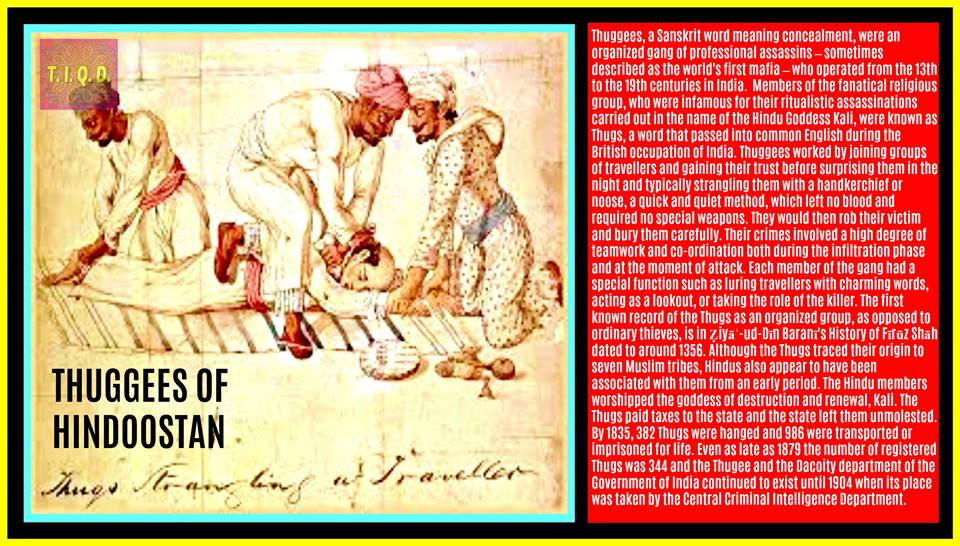TIQD#51 - Thuggees of Hindoostan
Written by : T.I.Q.D Team
Dated: December 26,2017
Share

Thuggees of Hindoostan
#incredibleindia #theindianquest #thuggee #northindia #criminals #britishindia #colonialhistory #history #culture #society
The Thugs were a well organised body of professional assassins, who, in gangs of from 10 to 100 wandered in various guises throughout India, worked themselves into the confidence of wayfarers of the wealthier class, and, when a favourable opportunity occurred, strangled them by throwing a handkerchief or noose round their necks, and then plundered and buried them. All this was done according to certain ancient and rigidly prescribed forms and after the performance of special religious rites, in which was the consecration of the package, and the sacrifice of sugar. They were staunch worshippers of Kali, the Hindu Goddess of destruction. Assassination for gain was with them a religious duty, and was considered a holy and honourable profession. They had, in fact, no idea of doing wrong, and their moral feelings did not come into play. The will of the Goddess, by whose command and in whose honour they followed there calling, was revealed to them through a very complicated system of omens.
In obedience to these they often travelled even the distance of hundred miles in company with, or in the wake of, their intended victims before a safe opportunity had presented itself for executing their design; and when the deed was done, rites were performed in honour of that tutelary deity, and a goodly portion of the spoil was set apart for her. The Thugs had also a jargon of their own, as well as certain signs by which its members recognised each other in the remotest part of India. Even those who from age or infirmities could no longer take an active part in the operations used to aid the cause as watchmen, spies or dressers of food. It was owing to their thorough organisation, the secrecy and security with which they went to work, but chiefly to the religious garb in which they shrouded their murders, that they could continue for centuries to practise their craft. The extraordinary fact was that Thugee was regarded as a regular profession by Indian Rulers of the day, both Hindu and Mahomedans. The Thugs paid taxes to the state and the state left them unmolested.
It was not until the British became rulers of the country that an attempt was made to suppress the Thugs. By 1835, 382 Thugs were hanged and 986 were transported or imprisoned for life. Even as late as 1879 the number of registered Thugs was 344 and the Thugee and the Dacoity department of the Government of India continued to exist until 1904 when its place was taken by the Central Criminal Intelligence Department. While it is not possible for the criminal tribes to live by organized bodies of criminals, crime continues to be their main occupation.
